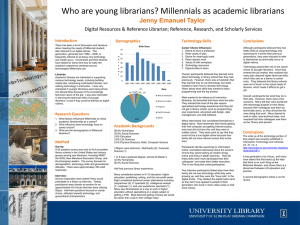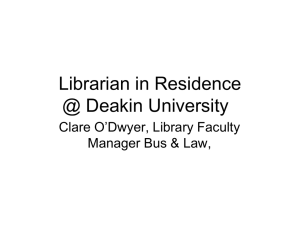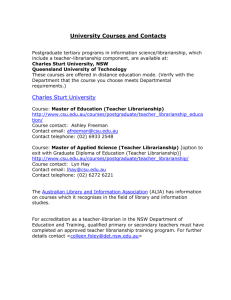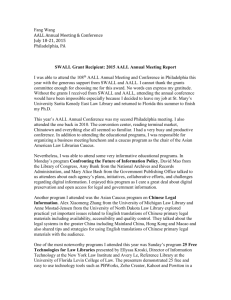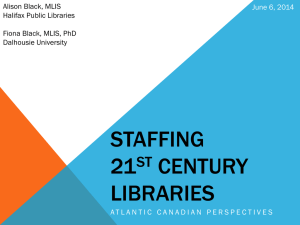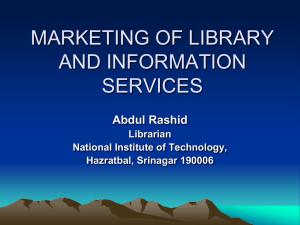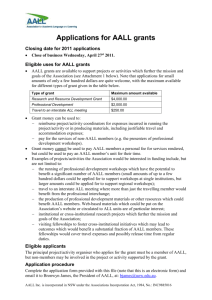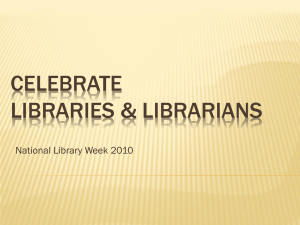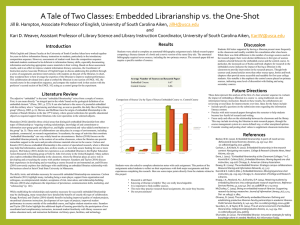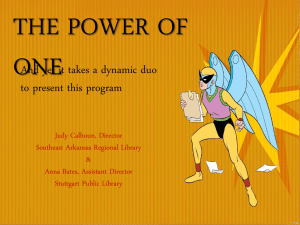Educated but Underpaid
advertisement
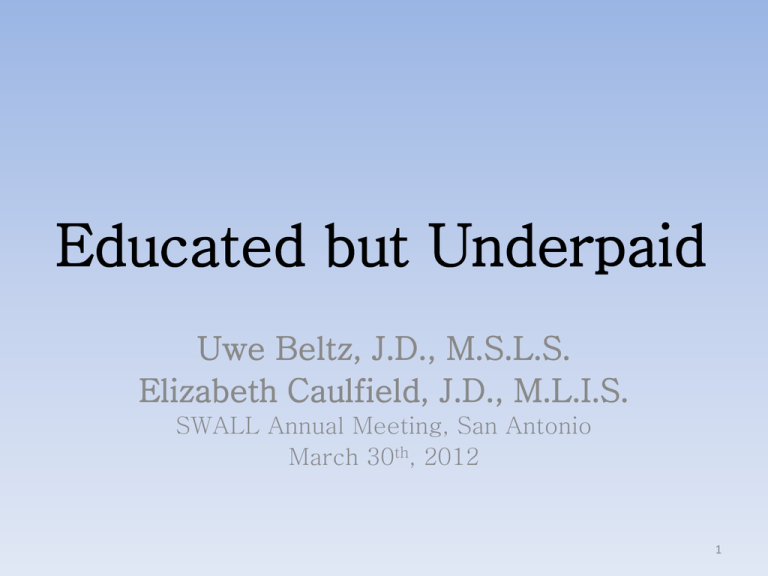
Educated but Underpaid Uwe Beltz, J.D., M.S.L.S. Elizabeth Caulfield, J.D., M.L.I.S. SWALL Annual Meeting, San Antonio March 30th, 2012 1 I can interview you, but... 2 “...fewer than 20% of the law librarian positions being filled require both degrees.” AALL, Education Requirements, http://www.aallnet.org/mainmenu/Careers/lawlibrarycareers/Education-Requirements 3 But a study of law-lib job advertisements shows that about 69% of the academic law library ads from 1991 – Jan. 2011 either prefer or require both the MLS and JD Study by Chuck Marcus, Faculty Services Librarian, UC Hastings College of the Law Library, on file with presenter 4 2011 5 2009 6 How did the expectation that the law librarian would have a J.D. develop? 7 Are law librarians bonded to the legal profession or serving in bondage? See Christine Brock, Law Libraries and Librarians: A Revisionist History; or More Than You Ever Wanted to Know, 67 Law Libr. J. 325 (1974). 8 Our history 1906 - New York State Library School – lectures on law books/organization of law libraries 1910-1926 - New York State Library School – formal program for those who had studied law 1935 – AALL Executive Board: legal education = “essential”; library education = “desirable” 1937-1961 – Columbia School of Library Service – legal bibliography (no formal legal training necessary) (for six weeks during alternate summers) 1937 – AALS recommended that by 1940, member schools have “qualified librarian” devoted to library service (rather than rotating clerks/students) 1939 – University of Washington – masters in law librarianship – must have J.D.) (program initially led to Bachelor’s) 9 Our history 1952 – AALS: the law librarian should “have a sound knowledge of the practical problems of a law school library, or a legal education, and preferably both.” AALS also recommends faculty status. 1953 AALL meeting – suggestion of 1 yr. library sch., 1 yr. law sch., and 1 yr. of electives from both – rejected! 1958-1962 – several universities instituted library programs or courses with emphasis on law librarianship (UNC, Case Western, U of Ill, Drexel) 1964 – AALL rotating institutes for librarians with little formal training 1965 – AALL certification program, ended in 1983 b/c of potential conflict with AALL’s tax-exempt status 1971 – AALS required that member schools’ librarian be dual-degreed 10 Head academic law librarians Historical Picture Survey and Report of the Committee on Education for Law Librarianship, 29 Law Libr. J. 198 (1936). Miles O. Price, The Law School Librarian’s Educational Qualifications: A Statistical Study, 10 J. Legal Ed. 222 (19571958). Dual degreed 70% 60% 50% 40% Dual degreed 30% 20% 10% 0% 1936 All law libraries of 10K+ 5% 1957 25% 1962 29% 1974 59% Connie E. Bolden, Educational and Experience Backgrounds of College and University Law Librarians, 57 Law Libr. J. 58 (1964). James F. Bailey and Mathew F. Dee, Law School Librarians: Survey Relating to Autonomy and Faculty Status, 67 Law Libr. J. 3 (1974). 11 Academic law librarians AALL, The AALL Biennial Salary Survey, 1999. Dual Degreed 60% AALL, The AALL Biennial Salary Survey & Organizational Characteristics, 2011. 50% 40% 30% Academic Libraries 20% 10% 0% 1999 30.3% 406 of 1338 academic law librarians responding to the survey were dual-degreed 2011 55.1% 552 of ____ academic law librarians responding to the survey were dual-degreed 12 Historical attitudes about legal subject specialization and the J.D. 13 Current state of law librarianship 14 “Current” attitudes about legal subject specialization and the J.D. 15 1988 – AALL drafted Guidelines for Graduate Programs in Law Librarianship 16 1988 – AALL drafted Guidelines for Graduate Programs in Law Librarianship 17 Current Educational Requirements for law librarianship per AALL 18 These Educational Requirements correspond to the 1988 Guidelines 19 These Educational Requirements correspond to the 1988 Guidelines “So, to qualify for almost any professional position in a law library, you must have an MLS or its equivalent. You may want to consider also earning a law degree. Armed with both JD and MLS degrees, you will be qualified for additional professional positions in law librarianship.” http://www.aallnet.org/main-menu/Careers/lawlibrarycareers/Education-Requirements 20 AALL Core Competencies (revised April 2010) 21 What are these guidelines, requirements, and competencies missing? Formal educational requirements 22 Can legal subject knowledge come from library education? 23 ALA list of 58 schools with ALA-Accredited programs 24 5 programs offer three or more classes in law l’ship 7 programs offer two classes in law l’ship 27 programs offer one class in law l’ship So 39/58 or 67% offer at least one class But 33% offer no classes and about 1/2 offer only one class 25 Alternatives to the J.D. 26 Alternatives to the J.D. - Library Master’s programs University of Denver: MLIS with Law Librarianship Specialization 27 Alternatives to the J.D. - Library Master’s programs University North Texas: Law Librarian and Legal Informatics Specialist 28 Alternatives to the J.D. – Certificate of Advanced Study in Law Librarianship at University of Denver 29 Alternatives to the J.D. – Master of Legal Studies University of Nebraska College of Law Legal R & W and either: Contracts, Property, or Torts 33 credit hrs + oral exam 30 Alternatives to the J.D. – Master of Legal Studies Arizona State University Sandra Day O’Connor College of Law U.S. Law and Legal Analysis; and Professional Legal Writing and at least two: Con Law Contracts, Criminal Law Property, or Torts 30 credit hrs 31 Alternatives to the J.D. – Master of Legal Studies West Virginia University Division of Public Administration • Law & the Legal System • Researching the Law • Law & Society • Administrative Legal Process • The Legislative Process • ADR • Research Capstone 36 credit hrs 32 Why should law librarians care about establishing educational requirements for their profession? Money – it’s a matter of equity Establish law librarianship as a real profession R. Tawney, in The Acquisitive Society (quoted by Christine Brock in 1974’s Law Libraries and Librarians: A Revisionist History; or More Than You Ever Wanted to Know): “The essence of a profession is that it assumes certain responsibilities for the competence of its members.” Justice Oliver Wendell Holmes, (quoted by Julius Marke in 1957’s The Education of a Law Librarian – A Panel): “Every calling is great when greatly pursued.” 33 Changes in Society/Changes in Profession • • • • • • More people attending college Increasing level of educational requirements More technology (and its impact) Fewer questions – more in-depth questions More inter/multi-disciplinarian Change in the nature of (law) librarianship Tenure Related Concerns • Tensions – JD vs Not – Tenure vs Not – Performance vs Scholarship – Standards – Teaching or not From: Carol Parker, The Need for Faculty Status and Uniform Tenure Requirements for Law Librarians 103:1 Law Libr. J. 7 (2011) From: Carol Parker, The Need for Faculty Status and Uniform Tenure Requirements for Law Librarians 103:1 Law Libr. J. 7 (2011) From: Carol Parker, The Need for Faculty Status and Uniform Tenure Requirements for Law Librarians 103:1 Law Libr. J. 7 (2011) Impact of Tenure on Salary: Does it impact Salary? $70,000 $65,000 $60,000 Yes - Tenure $55,000 No - Tenure $50,000 $45,000 $40,000 1999 2001 2003 2005 2007 2009 2011 Impact of Teaching on Salary $70,000 $65,000 $60,000 Yes - Teaching $55,000 No - Teaching $50,000 $45,000 $40,000 1999 2001 2003 2005 2007 2009 2011 Other Professionals Number of postings where JD required is increasing 80.0% 70.0% 60.0% 50.0% Each Year's %age 40.0% Cummulative %age 30.0% 20.0% 10.0% 0.0% 1 2 3 4 5 6 7 8 9 10 11 12 13 14 15 16 17 18 Totals (all Dual Degree – vs – All Others) $64,000 $62,000 $60,000 $58,000 $56,000 $54,000 Total -Both $52,000 Total -Other $50,000 $48,000 $46,000 $44,000 $42,000 $40,000 1999 2001 2003 2005 2007 2009 2011 Totals (less than 2 years experience Dual Degree – vs – All Others) $60,000 $50,000 $40,000 Ref-Both <2 $30,000 Ref-Other <2 $20,000 $10,000 $0 2003 2005 2007 2009 2011 Embracing Today, Innovating for Tomorrow! • • • • • • Continuing education Look for service opportunities Keep doing well what you do well already Avoid becoming obsolete Become an advocate for law librarianship Work within regional/national professional organizations…. • Organize/Unionize? • Keep a balance Questions? / Discussion! / Suggestions • Uwe Beltz, J.D., M.S.L.S. – uwe.beltz@ttu.edu or 806-742-3990 – ext. 286 • Elizabeth Caulfield, J.D., M.L.I.S. – elizabeth.caulfield@ttu.edu or 806-742-3990 – ext. 311
